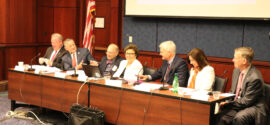Defining My Dyslexia
By Blake Charlton (New York Times)
May 22, 2013 / Op-Ed Section
From the Desk of the Yale Center for Dyslexia & Creativity Co-Director
Sally Shaywitz, M.D.:
The Yale Center applauds the recent publication by The New York Times of a passionate and accurate Op-Ed, “Defining My Dyslexia,” by Blake Charlton, MD, whom I have known and admired since his days as a Yale undergraduate and who is profiled on this website (click here to read/listen to it). Dr. Charlton shines the light on and disputes the oft misstated belief that somehow dyslexics all have a special talent. The potentially harmful consequence of such a view is well articulated in a letter by Kalman Hettleman also published by the Times in response to Dr. Charlton.
Dr. Charlton, who is dyslexic, well understands and aptly captures the paradox that is dyslexia: a weakness surrounded by a sea of strengths. Yes, many who are dyslexic are often out-of-the box, big picture thinkers but at the same time, these same individuals often are not particularly great artists, spatial thinkers or the like and it would be wrong, and indeed, harmful to suggest that such “talents” are an integral part of being dyslexic. And this is precisely what both Dr. Charlton and Mr. Hettleman want to bring to our attention. Dr. Charlton notes the desire among some to paint dyslexia as an advantage. Yet, for most children with dyslexia, particularly during their school years, their slow reading and poor spelling present significant disadvantages. Following a recent lecture, a parent shared her child’s distressed reaction to being told that dyslexia is a gift, “If it’s a gift, how can I give it back.” Far too often, especially for disadvantaged and poor children and for children of color or Latino ethnicity, “their problems in learning to read are either diagnosed too late and treated too little, or not diagnosed or treated at all.” The Yale Center is quite concerned about this and has taken an important step to bring attention to, and hopefully, redress this unacceptable harm coming to so many children by launching a new initiative, the Multicultural Dyslexia Awareness Initiative (MDAI).
Often and quite accurately, we bemoan the “knowledge gap,” that is, the gap between existing knowledge and the knowledge necessary to bring about improvements in health or education. In the case of dyslexia, (while there is always the desire for more), there is currently sufficient knowledge to do a far better job in identifying, intervening in and accommodating dyslexia. There is an unacceptable and harmful wide gap between the robust existing science of dyslexia and how this knowledge is implemented, typically not implemented, by schools. In dyslexia, there is not a knowledge gap but rather an action gap. As a consequence dyslexic children frequently go unidentified, unremediated and unaccommodated with great harm to the children, to their families and to society. Educators must act to translate this body of converging science into policy and practice. Our children’s lives and futures (human capital) are too precious to waste.
“Perhaps I’ve succeeded not despite, but because of, my disability.”
Physician and author Blake Charlton writes:
“Not a disability? My years of functional illiteracy suggest otherwise. Today’s educational environment exacerbates dyslexic weaknesses. Schools misidentify poor spelling and slow reading as a lack of intelligence; typically diagnose the condition only after students have fallen behind; and too often fail to provide dyslexic students with the audio and video materials that would help them learn. Until these disadvantages are removed, “disability” most accurately describes what young dyslexics confront.”
Read the Op-Ed in its entirety–click here.
Related

Congressional Dyslexia Roundtable
Excited, we have unusually positive news to share about science, dyslexia and legislation. Far too often there is …
Read MoreUpdate on the Connecticut Longitudinal Study (CLS)
Much of this new scientific understanding of dyslexia has emerged from a longitudinal study, the Connecticut Longitudinal Study …
Read MoreCoursera: Exciting New Online Dyslexia Course
A very exciting announcement that positively impacts children with dyslexia, their parents and their teachers is the Dyslexia …
Read MoreWho will be the first civilian in space? A dyslexic of course—Sir Richard Branson.
Who will be the first civilian in space? A dyslexic of course—Sir Richard Branson. On Sunday, Sir Richard …
Read More